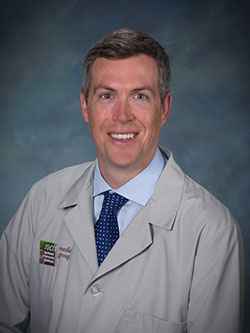Listen to your heart: what racing, skipping and fluttering can mean
February 4, 2019

The NCH Heart and Vascular Center can help
We’ve all felt something weird with our hearts at one time or another. It may race, skip, flutter, slow down or speed up, depending on what we’re doing. But many times patients can have undiagnosed heart rhythm irregularities. NCH Medical Group Cardiologist Christopher Henry, M.D., who specializes in electrophysiology, answers questions about what’s normal and not normal.
What are heart rhythm irregularities?
There are a variety of heart rhythm irregularities. One is an abnormal rhythm called atrial fibrillation or AFib, which affects the upper chambers (atria) of the heart. Patients can present with a variety of symptoms. They can be mild, like fatigue or palpitations, where you feel like your heart is beating fast or irregularly. There could also be lightheadedness, shortness of breath or even chest pain at times.
How is AFib diagnosed?
The way we diagnose it is with an EKG or an electrocardiogram. Sometimes it can be hard to tell what’s normal and what’s not because in the early stages of the disease, AFib can be there for minutes or hours or days and then go back into a normal rhythm. As the disease progresses, patients have longer or more frequent episodes. Regarding the heart, you have any concerns you should see you physician and have an EKG, if necessary.
How can I tell if my heartbeat is abnormal and not stress or exercise induced?
If after a period of time of stress or exercise, the heartbeat continues to beat fast long after you’re sitting at rest, you should see a physician. Sometimes the symptoms can be as mild as feeling more fatigued, and that can alert you to something being wrong. Seeing a doctor routinely is important because he/she will listen to your heart which can lead to a diagnosis.
What causes AFib?
It’s a very complex disorder and there are many different things that can contribute to it. Common risk factors are high blood pressure or hypertension, being overweight, or having a history of heart problems including having a previous heart attack or having problems with the valves of the heart. As people get older, it increases the risk for atrial fibrillation. Excessive alcohol use and obstructive sleep apnea also can contribute. There may be a genetic component, but for the majority of patients with the disease there hasn’t been one clearly defined gene.
How are AFib and other heart irregularities treated?
We work to minimize symptoms. Since atrial fibrillation increases the risk for stroke, it is recommended for most patients that they start a blood thinner to reduce this risk. The other issue with AFib is that it can cause the heart to race fast which can potentially make the heart muscle weak. Management for maintaining a normal heart rhythm and reducing symptoms includes treatment with medications or undergoing procedures such as catheter ablation, where we gain access to the heart through blood vessels in the groin or neck. Catheters are fed into the heart and areas that are responsible for causing trouble – usually the pulmonary veins – are targeted for ablation. During the procedure we’re able to look at the electrical signals of the heart and build a map of the heart, targeting those veins and other areas that are causing AFib.
What should patients keep in mind about AFib?
AFib tends to progress. In many patients, in the beginning we’re able to treat them with mild medication, but as the years go on, they will require stronger medication and that medication can have side effects. Catheter ablation is a good option for these patients. It’s important to note that there’s no definitive cure for AFib. We aim to reduce or minimize it.
What are some other heart rhythm irregularities?
There are arrhythmias and other irregularities that patients can develop, such as supraventricular tachycardia (SVT). In general, it’s a non-life-threatening rhythm but one that makes the heart race very fast and often can make patients feel quite symptomatic. It can come intermittently but often progresses with episodes happening longer and more frequently. The treatment for these patients is similar – medications and catheter ablation.
How is ablation performed? Is it surgery?
This is not considered surgery, but a minimally invasive procedure. For SVT, the procedure is done under conscious sedation; the patients are awake but in a twilight state. It takes two to three hours. When we’re doing an atrial fibrillation ablation, the patient is asleep or under general anesthesia and the procedure might take two to four hours.
To gain access to the heart, we make very small puncture sites in the groin or neck. We don’t make large incisions and the puncture sites heal up and resolve quickly.
What type of patients do you see?
The patients I see at clinic and in the hospital are almost always dealing with heart rhythm issues. In addition to patients with AFib and SVT, I see patients with arrhythmias coming from the ventricles (the lower chambers of the heart) such as premature ventricular contractions (PVCs) or ventricular tachycardia. I also treat patients with slow heart rates for which the treatment often is a pacemaker. Finally, patients who have had or who are at risk for some life-threatening heart arrhythmias, a defibrillator (ICD) can be implanted.
Are there recent advancements to treat heart rhythm irregularities?
Technology has greatly advanced over the last couple of decades to help patients. It’s amazing. Pacemakers, defibrillators and ablation procedures have become safer and more effective at managing heart rhythm problems.
Dr. Henry practices in the Busse Center at 880 W. Central Road, Suite 7100 in Arlington Heights. Patients may need a referral from a cardiologist or primary care physician. To make an appointment with Dr. Henry or an NCH Cardiologist, call 847-618-AFIB or visit nch.org/flutter for more information on the NCH Heart and Vascular Center.
Learn more about cardiovascular care at NCH.